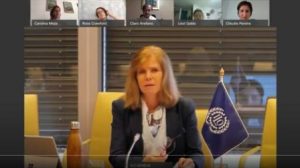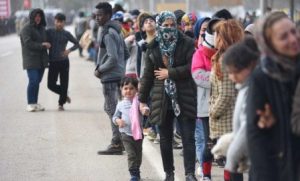COVID-19 Calls for Reforms in International Migration Governance
Employer--employee partnership and collaboration between government, private sector and civil society to formulate a rights-based approach to migration governance are needed.
 The COVID-19 pandemic has pushed the hitherto vulnerable migrants and refugees into extremely precarious conditions. Migrant workers are losing their source of livelihood in addition to being more exposed to the virus owing to their position at the frontlines of pandemic battle. This calls for a look into the many faces of women and men migrant workers, formulation of strategies to tackle the immediate crisis and to build a better future for labour migration in the post COVID-19 world. It was in this backdrop that the International Labour Organisation (ILO) conducted a webinar on 26 June 2020, moderated by Michelle Leighton, Chief Labour Migration, ILO Geneva, where panellists from seven continents gave their expert opinions.
The COVID-19 pandemic has pushed the hitherto vulnerable migrants and refugees into extremely precarious conditions. Migrant workers are losing their source of livelihood in addition to being more exposed to the virus owing to their position at the frontlines of pandemic battle. This calls for a look into the many faces of women and men migrant workers, formulation of strategies to tackle the immediate crisis and to build a better future for labour migration in the post COVID-19 world. It was in this backdrop that the International Labour Organisation (ILO) conducted a webinar on 26 June 2020, moderated by Michelle Leighton, Chief Labour Migration, ILO Geneva, where panellists from seven continents gave their expert opinions.
Migration Governance
According to ILO statements, there are over 164 million migrant workers worldwide, nearly half of them women, comprising 4.7 per cent of global labour force. While the pandemic has rendered them jobless and stranded in host countries with less access to social protection, millions have also returned to home countries where unemployment and poverty awaits them. Michelle Leighton, acknowledging this, posed the question: How do we use the moment of crisis to ‘adjust and reform’ labour migration system across the world so they are more ‘accountable, rights based and provide prosperity for migrant workers and businesses’? In pursuit of answers, the panellists from different parts of the world shared their lessons and experiences.
Also Read : COVID-19 and International Migration Governance
Claro Arellano, Undersecretary at Legal and Overseas Operations Cluster, Philippines, shared the model adopted by their government in aiding the migrant workers. The Crisis Management Committee of Philippines is providing assistances like free COVID tests upon arrival, quarantine facilities, psychosocial counselling and food medical and transportation facilities to ensure seamless repatriation of workers. Along with repatriation, reintegration of returnee migrants to home country is also given equal attention through programmes like financial assistance and social protection schemes. He stated how the DOLE AKAP, one-time financial assistance programme launched by the Philippines government, has dispersed over 1.5 billion pesos among 140,000 displaced Filipino workers, as of 24 June, to assist their reintegration.
The Filipino model detailed by Arellano found resonance in the model adopted by Portugal government as described by Cláudia Pereira, the Secretary of State for Integration and Migration, Portugal. She delineated various steps taken by the government – the extension of citizenship rights to immigrants, extension of validity of documents up to 31 October, translation of official documents to variety of languages to ensure they are accessible to immigrants, provision of housing facilities to secure proper isolation and quarantine, etc. to name a few.
Moment to Reckon with the Blind Spots
Carolina Meijia Micolta, Vice President of National Association of Entrepreneurs of Columbia, called for provision of humanitarian assistance, equal treatment of migrant workers and inclusive employment programmes.
Micolta shed light on how migrants are unfairly disadvantaged by the pandemic, despite the dividends they pay to both employers and the state.
Along with their disproportionate representation in precarious jobs, a major reason behind this is the legal loopholes in regulatory framework. For instance, the law enforced by the UK government forbids overseas workers from changing their employer before 6 months, which has rendered many migrant workers undocumented, translating to less access to health and social security services. This was pointed out by Rosa Crawford, Policy Officer of Trades Union Congress,UK, who highlighted the role of trade unions in calling out against hostile government policies and demanding reforms.
Ghada Hammouda, Chief Sustainability & Marketing Officer at Qalaa Holdings, Egypt, in agreement to the panellists, shared about the opportunities presented by the pandemic. She stated how the mass production shutdown caused by pandemic has global ripple effects on demand and supply sides, and has led to the re-examination for new market sources. This presents a huge opportunity for countries which can reap benefits by equipping their youth for taking advantage of the new normal. Quoting Milton Friedman, she added, “Only an act of crisis can produce change.”
 Need for Dialogue and Co-operation
Need for Dialogue and Co-operation
Anna Lissa Rodrigo Galdo, International Domestic Workers Federation (IDWF) affiliate based in Malaysia, shared the plight of domestic workers who are losing jobs or exploited during the lockdowns. She also shared positive outcomes of donations from individuals and collaborations with NGOs and other civil society organisations (CSOs) which helped them to provide sanitizers, masks, food and other aid to migrant workers. All panellists agreed on the need of forming a narrative based on mutual dialogue and consent. While Claro Arellano called for a constant dialogue between source countries and host countries to ensure coordinated responses to crisis faced by migrants, Ghada Hammouda espoused the need for employer–employee partnership and collaboration between government, private sector and civil society to formulate a rights-based approach to migration governance characterised by integration of database, lubricated legal channels to ensure workforce mobility and measures to prepare the labourers for the economic module of the post-pandemic world.
Transitional Justice in the South Asian Context
The representatives of Migrant Forum in Asia and Solidarity Centre, Sri Lanka, emphasised on increasing the stakes for responding to the current migrant crisis induced by the pandemic. They were responding to the questions raised by the panellists at the forum. This was with regard to securing transitional justice for migrant workers. The concept was elaborated upon in a follow up conversation held with the Delhi Post by Shabari Nair, Regional Labour Migration Specialist for South Asia, Decent Work Team (DWT), ILO.
Also Read : International Migration Governance is Alive and Well: Says ILO’s Migration Specialist
With COVID-19 pandemic causing mass production shutdowns and job loss, number of migrant workers are returning to their countries of origin. In South Asia, just between Bangladesh, India, and Nepal, so far close to a million migrants have returned. They include 500,000 Nepalese who returned from India and more than 250,000 Bangladeshis. Over 220,000 migrants including vulnerable migrant workers were repatriated through the Vande Bharat Mission of India alone. In addition to being forced by circumstances to return to home countries, migrants are subjected to wage theft, debt traps and violation of their rights.
On returning, they carry the fear of infection, limited access to protection mechanisms and land in a wrecked job market. The absence of proper reintegration policies in the country of origin heightens the troubles faced by migrant workers. In this context, framing a transitional justice mechanism becomes not a condition, but an imperative, Shabari Nair pointed out. He informed about the ‘Call for an Urgent Justice Mechanism for Repatriated Migrant Workers’ launched by a coalition of stakeholders including Migrant Forum in Asia (MFA), Lawyers Beyond Borders (LBB) Network, Cross Regional Centre for Migrants and Refugees (CCRM), South Asia Trade Union Council (SARTUC), and Solidarity Centre (SC).
The objectives of transitional justice mechanism highlighted by them include “expedited, accessible, affordable, and efficient” system for addressing grievances, claims and labour disputes of repatriated workers.
It also calls for ensuring access of workers with legitimate claims to “justice and some kind of compensation”, swift resolving of claims sans any unjustified delay and States making it mandatory for employers and businesses to keep all employment records, including payroll, employee lists, and hours worked and allow workers to take copies of their records with them.
Shabari Nair also mentioned about the recently adopted Skills Passport in Sri Lanka and the introduction of the Skilled Workers Arrival Database for Employment Support (SWADES) Skill Card in India. Such measures are good practices to put to practice the Recognition of Prior Learning (RPL), which the ILO is advocating as an important measure for sustainable reintegration and is highly beneficial to both the repatriated migrant workers and potential employers. Collaboration between countries of origin and destination are essential in implementing fair and efficient policies of repatriation and reintegration. Regional processes like the Abu Dhabi Dialogue (ADD), which brings together 11 source countries and seven host countries of migration on one platform has an important role to play in this regard. The ADD had its opening plenary discussion on 6 July 2020 under the aegis of the Global Forum on Migration and Development (GFMD), chaired by the Government of the United Arab Emirates (UAE) this year.
ILO, being a tripartite organisation, mobilise the voices and perspectives of government, employers and trade unions. By adopting ‘whole-of-society’ approach and fostering social dialogue, steps can be taken towards ensuring social justice, Shabari Nair concluded.
The webinar ended on a positive note imparted by the final panellist, Mohammad, a Syrian Refugee in Turkey who is happy at having got to spend more time with his family and is assured of seeing light at the end of the tunnel through his passion, ideas and skills.
